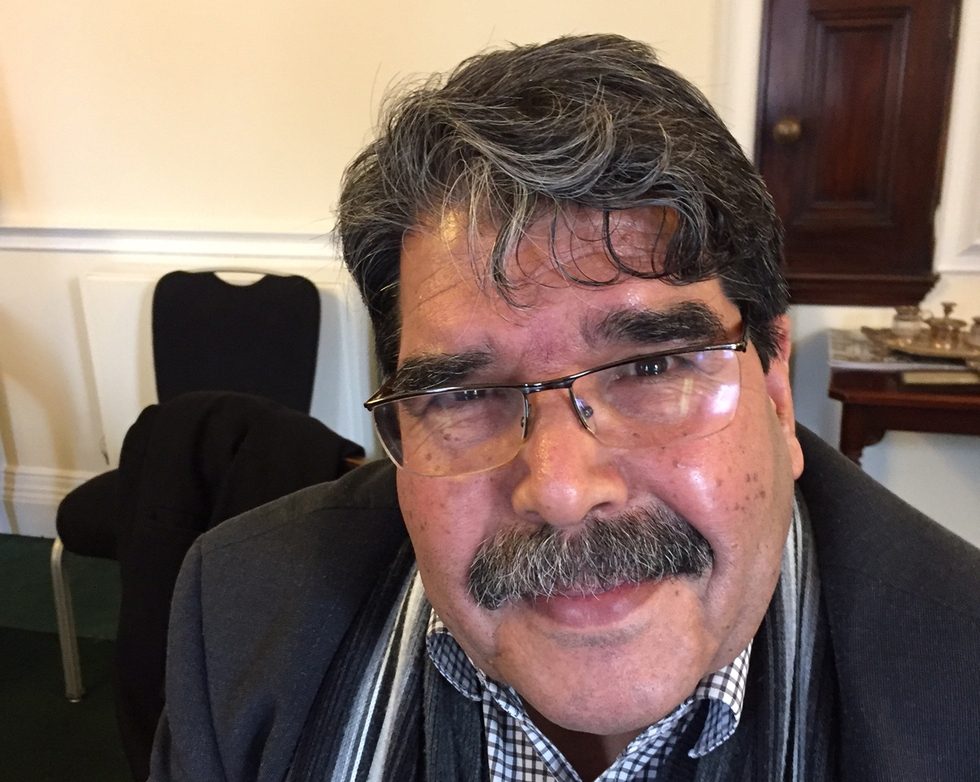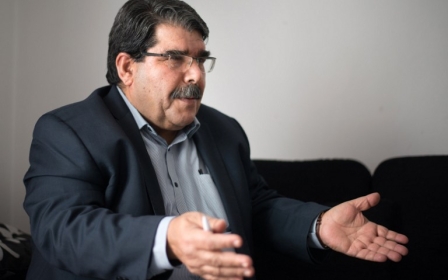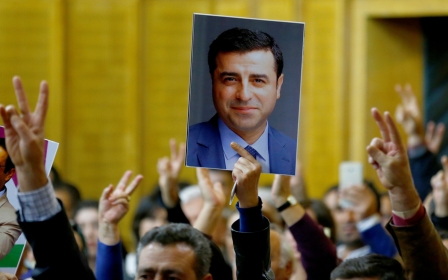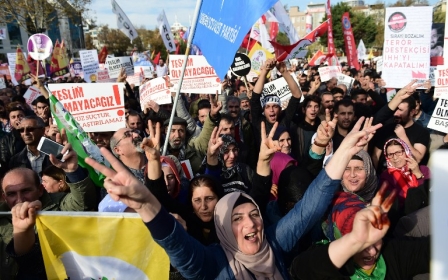EXCLUSIVE: Salih Muslim, Syrian Kurdish leader, dismisses Turkey arrest warrant

Salih Muslim, the co-chair of the Syrian Kurdish Democratic Union Party (PYD), has shrugged off the arrest warrant issued against him by Turkey on Tuesday. It was an effort to limit his travels around Europe, where he is explaining the Kurdish position on seeking democratic autonomy within Syria and other regional states with large Kurdish populations, Muslim told Middle East Eye in London.
With a soft dig at Turkey’s President Recep Tayyep Erdogan who wants to take more authority by changing the constitution, he said, “The Sultan was bothered about our movements, too much moving around in Europe. This was to put some limits on it.”
The PYD leader has good contacts with European governments. By coincidence, the arrest warrant was announced while Muslim was meeting British officials at the Foreign and Commonwealth Office, and just before he went off to address parliamentarians in the House of Lords. Muslim has an office in Brussels and frequently talks to officials in other European capitals.
The Turkish government seeks to equate the PYD with the militant Kurdish organisation in Turkey, the PKK, which is banned as a terrorist group in many European countries and the United States. Turkey has frequently called for the PYD to be similarly banned.
The arrest warrant for Muslim looks like a further move in this direction, although it has not been backed by an appeal to Interpol to issue a Europe-wide alert for him. Muslim pointed out that he is a citizen of Syria and not Turkey. But while taking an outwardly relaxed view of the Turkish warrant, the Syrian Kurdish leader made it clear that he saw serious threats behind it.
"It’s a kind of warning for me, because we don’t know what they are going to do. They have their cells everywhere and they can maybe make suicides, whatever. Anyway, we don’t care," he told MEE.
The warrant claims Muslim is linked to the 17 February bombing against a military convoy in Ankara, which killed at least 28 people. The Kurdistan Freedom Falcons (TAK) - a radical splinter group of the better-known PKK - claimed responsibility for the suicide bombing, saying it was in response to security operations in the southeast of Turkey.
Muslim said the PYD had promptly condemned the bombing, adding that the PYD is merely a political organisation with no control over the armed forces in its heartland of northern Syria (which the PYD calls Rojava), let alone anywhere else.
'It’s a kind of warning for me, because we don’t know what they are going to do'
He argued that most of the other recent bombings in Turkey had targeted Kurdish civilians and were done by shadowy groups linked to the Turkish state.
In Rojava, the armed groups, known as the People’s Protection Units (YPG) have made significant gains against the Islamic State (IS) group over the past two years. They gained control over two crossing points on the Syrian-Turkish border and stopped the flow of militants, arms and finance to IS.
The YPG, along with local Arab allies, were moving towards the last IS-controlled border at Jarabulus this summer when Turkey invaded with troops and tanks.
Ostensibly aimed at IS, the Turkish invasion was in reality designed to protect IS and stop the Kurds from linking Rojava with the Kurdish-held region of Afrin in north-western Syria, the PYD leader said.
In spite of Turkish claims in being opposed to IS, Muslim told MEE that it was all "lies": “There are still camps near the border. They are still training Daesh and receiving wounded fighters. If the Turks say they’re stopping Daesh, it’s lies and not true.”
Complex web of ties
He claimed the Turkish government was trying to move Kurds out of the northern Syrian border areas, and replace them with Turkomen (Syrian citizens of Turkic origin) and Arabs from other parts of Syria and even with Turks from Turkey itself.
The PYD has regular meetings with US diplomats and the YPG has received US airdrops of weapons as well as help from several dozen US Special Forces. The Americans see them as a crucial component of the mixed Kurdish, Arab and Yazidi forces known as the Syrian Democratic Forces who are meant to be the spearhead of campaign to retake IS’s self-declared capital, Raqqa.
These battlefield links have forced the YPG and PYD to submit to various US warnings. The US is trying to maintain a working relationship with Turkey while also collaborating militarily with the Syrian Kurds. Muslim said the Syrian Kurds had planned to try to roll back the Turkish seizure of Jarabulus, but "the Americans said we cannot help you". This was different from the situation when IS seized the border city of Kobani in 2014 and the ferocious and sustained US bombing raid helped the YPG recapture the town.
Similar US pressure has led to the YPG withdrawing from the town of Manbij which the Kurdish-led Syrian Democratic Forces seized from IS in August with the help of US air strikes. The town, a few miles east of Aleppo, lies on a crucial supply route from Turkey to Raqqa. The Americans later urged the YPG to pull back and leave the town to local self-defence groups. This week Erdogan said Turkey-backed forces had the town in their sights.
Muslim sought to explain the YPG pullout as a tactical deployment, so as to focus on Raqqa.
“The YPG has withdrawn from Manbij because of the Raqqa operation. They were there to train local forces and police. The groups left there are local ones, allied to the Syrian Democratic Forces,” he said.
While working closely with the Americans, Muslim also has good relations with Russia. Asked whether he expected the Americans would overcome the resistance shown by the Pentagon under Obama and join the Russians in battling IS, as Donald Trump has suggested, the PYD leader told MEE: "We hope so. Daesh is the enemy of everybody. There should be joint use of force by the Russians and Americans. We will be satisfied with that. If both of them help us, we’ll be happy".
He also sees common ground between the Americans and Russians on one key aspect of a possible political solution for Syria. He believes both governments favour turning Syria into a federal state – much like how Iraq became a federal state after Saddam Hussein’s rule. This would give the Kurds the autonomy they have been seeking for decades.
The difficulty is that the Russians cannot persuade Syria’s Bashar al-Assad to accept it, nor can the Americans convince their allies among the Sunni Arabs who dominate the opposition to agree to a dilution of centralised Arab control.
'Daesh is the enemy of everybody. There should be joint use of force by the Russians and Americans'
The PYD has regular contact with Staffan de Mistura, the UN envoy who runs the Geneva negotiations. But the Syrian opposition’s High Negotiating Council refuses to allow the Kurds to attend Geneva as a separate delegation. Muslim believes that until Aleppo’s future control becomes clear, which could be soon, there is no chance of reviving Geneva.
While being fiercely opposed to IS, the PYD leader - whose organisation is strictly secular - is also critical of Syria’s Muslim Brotherhood and the other moderate groups who are strongly represented in the US-supported opposition.
Tension with Brotherhood
"If they accept to live in a secular country, in which everyone can express themselves, it’s OK. We believe religion should be on the ethical side, not more than that. Religion should not be used as a tool for politics, which is not valid for the Muslim Brotherhood because they are looking to establish a caliphate. They should keep religion in the church and the mosque," he said.
The PYD leader rejected criticism that his party seeks a monopoly of power in Rojava which has effectively broken away from the Assad government’s control. The outside world misunderstood the system, he said. Fifteen political parties had been registered. Some were in government, some in opposition and two rejected the whole system.
“The government is run by a council. The PYD is not the ruling party. The two parties which don’t accept the system have a louder voice than ours. They’re based in Istanbul,” he said.
One was called Unity, the other was the KDP Syria, linked to the Kurdish Democratic Party of Iraq, whose leader, Massoud Barzani, is president of the Kurdish Regional Government. Muslim accused Barzani of putting Rojava under siege by blocking medicine, food and humanitarian supplies from crossing from the Kurdish region of Iraq into northern Syria. Erdogan has blocked the crossings from Turkey.
"We tried many times to get good relations but it failed. They are blackmailing us for political reasons," he said. "It’s under Turkish orders, for sure."
Middle East Eye propose une couverture et une analyse indépendantes et incomparables du Moyen-Orient, de l’Afrique du Nord et d’autres régions du monde. Pour en savoir plus sur la reprise de ce contenu et les frais qui s’appliquent, veuillez remplir ce formulaire [en anglais]. Pour en savoir plus sur MEE, cliquez ici [en anglais].




